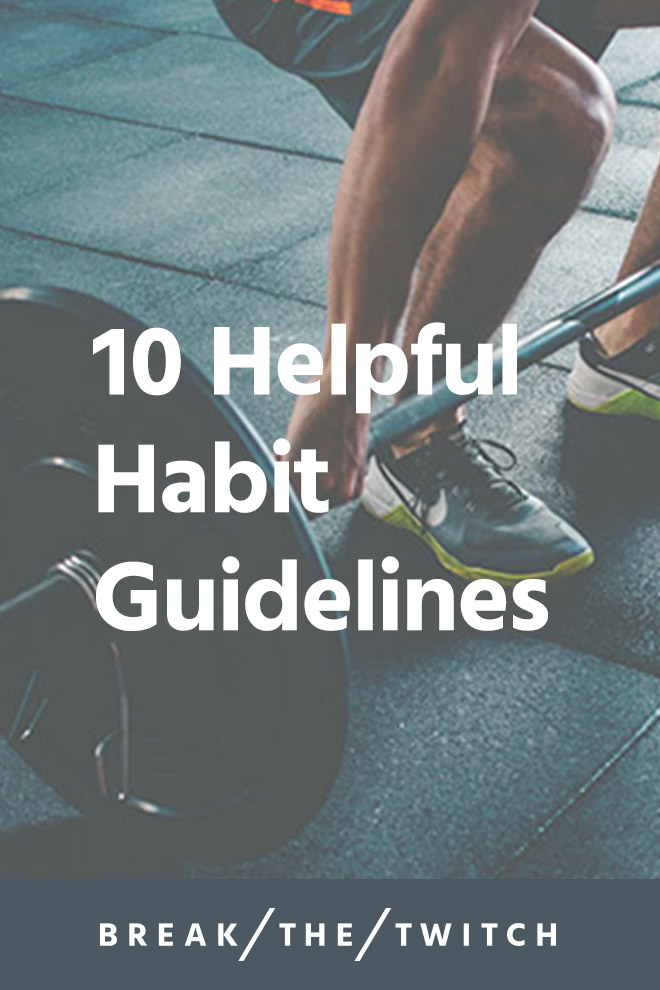
There are so many how-to resources on losing weight, building muscle, and eating healthier. But the bottom line is, they are all about building habits. Effective habit guidelines and practices can be applied to any area of life.
But while starting a new habit can be simple in theory, many of us know, it’s often difficult in practice—particularly when it comes to keeping them going! Most of us, myself included, have started a new habit with enthusiasm, only to fall off after several days or weeks. But there is a way to build habits successfully over time. It’s not going to be perfect, but it is possible.
I’m sharing 10 helpful habit guidelines, based on what I’ve learned over the years since embracing intentional living four years ago, building up a sustainable business and working towards my fitness goals. These guiding principles will help you decide what habits to start and how to keep them going over the long term.
Here are 10 helpful habit guidelines
1 / Smaller, for longer
Often when we start towards a goal or new habit, we begin too big, too fast. The key is to start smaller than you think and easier than your ability. That way, when life gets busy or when you’re more exhausted than usual, you have a better chance of keeping the habit going.
2 / Don’t aim for 100%
Instead of going full throttle and aiming for perfection, give yourself some breathing room. For example, if you want to work out seven days a week, you’re going to have a hard time when you get injured or sick. Rather than working at 100% intensity, work at a lower level.
3 / Be kind to yourself
Inevitably, there will be some days or even weeks when the habit you started falls off and that’s okay. Life happens. We’re all imperfect human beings. There’s no need to feel shame and beat yourself up about what’s in the past. There’s nothing you can do about what’s done, but what you can do is let go of the past and focus on the present moment.
4 / Missing matters less than restarting
When you miss a day or a week, simply restart. What matters more than missing a day is simply restarting the habit without any guilt or shame. Don’t let a bad day or week stop you from continuing on whatever habit or goal you’re working towards. Yes, you may lose a bit of progress, but that’s okay and you’ll be back to where you were and beyond before you know it.
5 / Action > outcome
While you may not be able to control the outcome, what you can control is your actions. Focus on what you can control, which is showing up and doing the work. When you show up and do the work consistently, results will eventually follow in its own way and time.
Ready to take action with secret member-only content and community resources? Join Attention Collective, our online community of like-minded humans from around the world, and get full access immediately. See you inside!
6 / Goal isn’t to do as much as possible today
Instead of trying to do as much as possible today, do what’s easily manageable for today and stop there. Don’t do so much that you’re too sore, tired or burned out the next day. The goal is to be able to do it again tomorrow and the next day and the next. Consistent progress beats massive, irregular efforts every time.
7 / Focus on starting a good habit (instead of kicking a bad one)
When it comes to our bad habits, it’s more effective to replace it rather than try to stop it. As an example, if you want to stop using your phone as much, try adding in a habit to replace the time when you’d usually look at your phone—perhaps scheduling in a daily walk with your partner, dog or friend in the evening. Or if you want to stop eating junk food, focus on eating more fruits and veggies during the day.
8 / Environment matters more than discipline
Discipline is fickle, and it’s exhaustible. All of us only have so much willpower and discipline each day. This is why designing your environment to make good habits easier on yourself is key. Use minimalism to get rid of the distractions. Create an intentional space that facilitates good habits. For example, if you want to eat less junk food, get rid of any existing items and don’t allow them in the home. If you want to stretch more, perhaps clearing a specific area where a yoga mat is already rolled out will help.
9 / Consistent average speed
Don’t worry about going too slowly. Going too fast will only result in mistakes, injuries, or hasty decisions—things that will eat up more time and result in slower progress than if you simply went at a consistent, average speed. Slow and steady beats fast and reckless every single time.
10 / Newton’s 3rd law
The concept of Newton’s 3rd law applied to habits is best illustrated with the example of throwing a ball against the wall. If the ball is thrown casually against the wall, it will come back towards you so you can catch it and throw it again. On the other hand, if you whip the ball at the wall, chances are it will come back and hit you in the face. This is a reminder that the harder you start out, the more resistance and potential setbacks you will face. So remember to start off nice and easy, and the resulting smaller resistance will make it easier to keep the momentum going.
For those of you who aren’t sure what habits to build, this guide on lifestyle experiments may be helpful. Lifestyle experiments are a way to test out a new habit you’re thinking about, without feeling like you need to continue after the experiment! If you’re looking for more ideas, you can take inspiration from these habits that resulted in some massive changes for me or from a list of 25 simple habit ideas. You may also be interested in how to build habits like an entrepreneur.

